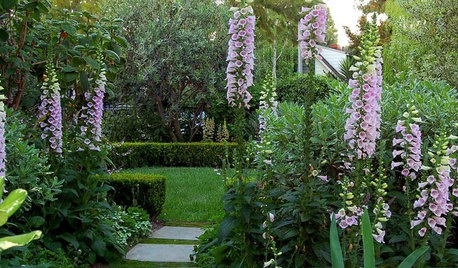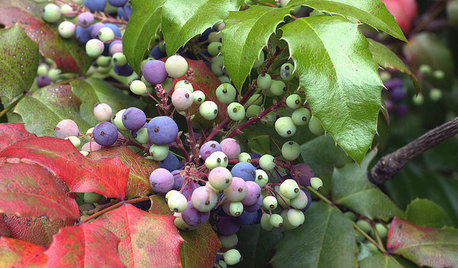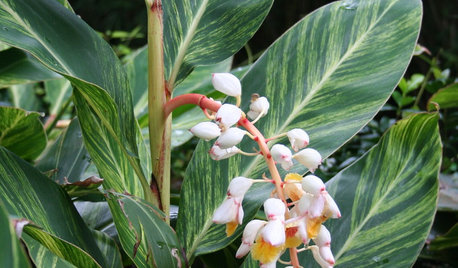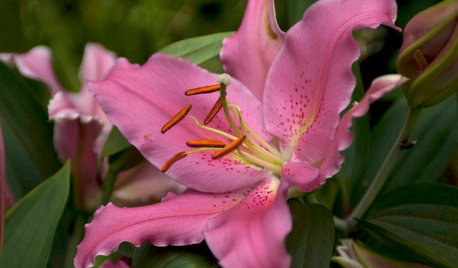Midge-Least toxic???
16 years ago
Featured Answer
Sort by:Oldest
Comments (13)
- 16 years ago
- 16 years ago
Related Discussions
The least toxic but effective fungus control?
Comments (20)Hydrogen peroxide? Way cool, esp. if it kills pests, too. Questions - How long can you use it, once the bottle's been opened? I've read that it's effective for only so long after being opened. Also, can you say more about "wash the plant top"? I'm not familiar w/ that term. Does it also kill spider mites, whiteflies, mealy bugs, etc.? Nancy, if you're still reading, be careful. Stitz - LOL - you know you want to be a smarta--! You know you do! And you do it so well. This is affectionate teasing - kinda like sister and bratty brother - hope that comes across. And you've got a good point. For a couple of months recently, I followed someone's suggestion here about not having fans on in the house in the winter because of the drying effect. Dunno if it's cause and effect. Regardless, the fans went back on a couple of weeks ago. Kevin, info at that link is too strange, esp. if the stuff's not supposed to touch your skin. Bruce, I can't take the stink of Neem oil in the house in winter - closed windows. Maybe outside in warm weather. Good conversation, y'all. WC8...See MoreMidge -- Does imidacloprid really work?
Comments (17)Spraying the soil around the bush will have little effect. The product must be used as a drench to get down into the soil. Using a hose end sprayer, spray the bush and drench the soil as directed for elimination of midge, to get rid of the adults and immature larva in the soil. Repeated application may be required to eliminate them completely. Using as Herryshoe says, with a hose end sprayer will apply it in drench proportions. Follow the directions on the label for a hose end sprayer or get a sprayer that will allow you to meter the proper amount to a gallon of water as listed on the label. Gilmore makes one. Spraying the soil with a regular insecticide sprayer and watering it in will dilute it too much. Here is a link that might be useful: Gilmore metered hose end sprayer...See MoreBent rose buds
Comments (16)Hi Maude 80, sorry to send you into a panic. Midge is pretty darn discouraging, but not the end of the world. Please excuse my lengthy response to follow :) I've had midge in my garden for a decade. I still have a riotous early flush that makes my heart sing & stops traffic and then scattered repeat bloom with increasing telltale wilting, burned matchstick tips, deformed bent buds as summer progresses. I say the following as a totally rose obsessed gardener for 15 years (I think I had ~70 roses at peak) Since rose midge hit, I've had to change my mindset about roses to deal with the discouragement that they aren't the same "continuous" bloomers. (I write this at the tail end of August--when midge damage is at it's worst--and I still probably have 200+ blooms on my ~25 roses.) I also have daffodils, iris, lilac, peonies, clematis, lilies, hydrangeas, & dahlias that I dearly love that don't continuously bloom--that I don't expect to--that I grow anyway ;) I've been culling poor rose performers and adding in these other plants which diversified my small urban garden in more of an integrated pest management approach. I read your joke about turning your yard into Chernobyl...in my research from a decade ago, I found the recommended insecticides for midge do kill birds (diazinon) & bees (imadacloprid). I just can't in good conscience use them. The best natural control--though painful to do--is to cut the buds that are just starting to wilt when you first see them, place in sealed bag & dispose to prevent the larvae from dropping to the soil to pupate & spread to your other bushes. (It would mean losing an entire cycle of blooms on those affected roses to reduce, but probably still not entirely eliminate, midge.) The least toxic control I read of at that time was spinosad & I used it as a soil drench once or twice that first year. Maybe it helped, hard to say? I believe Merit (active ingredient imadacloprid) is a systemic that is taken up through all parts of the plant (and persists in the soil for years as I remember) but used as a soil drench to get the pupae is possibly less bad than actually spraying the growing tips that bees visit?? Sorry to be the bearer of bad news with your midge diagnosis. May you continue to find much joy with your roses....See Moreleast toxic weed killer
Comments (7)I have been fertilizing with organic materials since 2002. It works. In fact I'll post a picture below. The fertilizer I use is alfalfa pellets. If I can find corn meal for less than $10 I sometimes use that as a fertilizer. These are food, so they are certainly non-toxic. The application rate is 15-20 pounds per 1,000 square feet. Also used in your area of the country is soybean meal. Apply at 15 pounds per 1,000. The weeds come when the grass thins out and the Sun can shine directly on bare soil. Weed seeds need direct sunlight. I'm thinking the grass is thin because you are not watering it. It could be that you live where you need to water very little, but if it needs it, it needs it. Here is a picture posted her many years ago by mrmumbles. He applied alfalfa pellets as a fertilizer to his zoysia lawn in that one spot in mid May. The picture was taken in mid June. You can easily see the improved color, density, and growth compared to the unfertilized turf. The organic fertilizer would help green up your lawn. If you have a grass like Kentucky bluegrass, it will become more dense. If you have a fescue or rye grass, it will only become more dense by annual overseeding in the late summer to early fall....See More- 16 years ago
- 16 years ago
- 16 years ago
- 16 years ago
- 16 years ago
- 16 years ago
- 16 years ago
- 16 years ago
- 16 years ago
- 16 years ago
Related Stories

HEALTHY HOMEDetox Your Kitchen for the Healthiest Cooking
Maybe you buy organic or even grow your own. But if your kitchen is toxic, you're only halfway to healthy
Full Story
HEALTHY HOMESleep Happier and Healthier in a Toxin-Free Bedroom
Light pollution, toxic bedding, wallpaper that off-gases ... if you're not getting good sleep, these bedroom blights might be to blame
Full Story
HOME TECHRecycle Your Electronics ... Into Furniture!
Eco awareness and geek-chic style merge in home furnishings made from the gadgets of days gone by
Full Story
PETSGarden Alert: 22 Plants to Keep Away From Pets
Avoid potential danger by keeping dogs and cats away from these landscaping and houseplant favorites
Full Story
GARDENING GUIDESGreat Design Plant: Mahonia Aquifolium for Birds
Oregon grape puts on a bold spectacle from spring through winter and is ideal to brighten partly shady corners in the U.S. West
Full Story
PETSPet-Proofing Your Home: A Room-by-Room Guide
Not all pet dangers are obvious. Keep furry friends safe and sound by handling all of these potential hazards
Full Story
HEALTHY HOMEGive Your Baby the Healthiest, Safest Nursery Possible
Protect your newborn by choosing nontoxic nursery furniture, bedding, rugs and paint. We give you all the details here
Full Story
GARDENING GUIDES7 Tropical Bulbs for a Summer Garden That Wows
Try these stunners in summer's powerful heat for garden thrills with an exotic flair
Full Story
FLOWERSGreat Design Plant: Lilies
Try these delightfully exotic stunners for paintbox colors, deep fragrance and intricately detailed petals
Full Story
DECORATING GUIDESConjure a Jungle in a Pot
Sprawling, climbing and with primitive-looking leaves, philodendrons bring untamed beauty to even the most civilized homes
Full Story


littlesmokieOriginal Author